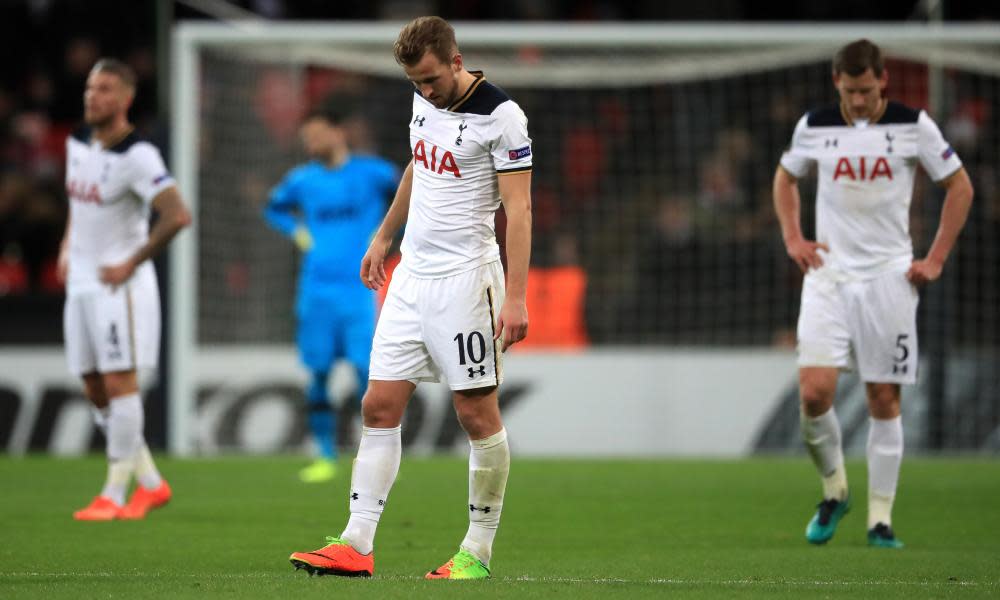Dele Alli’s rush of blood renders Tottenham’s intent fruitless | Jacob Steinberg

A Spursified Wembley felt like an incongruous setting for a Thursday night in the company of the eighth-best side in Belgium. Then again, that was precisely the kind of sniffy attitude that Tottenham Hotspur had to leave at the door if they were going to avoid another continental embarrassment. They have reached a point in their development where anything less than absolute commitment in the Europa League is impossible to defend, for all that football at their temporary European home was supposed to involve glamour ties against Barcelona and Real Madrid instead of the relative modesty of KAA Gent.
But Spurs flopped in the Champions League, their messy early exit forcing them to lower their sights. They could not view this competition as an inconvenience. Forget the Premier League. Keeping even half an eye on the game against Stoke City on Sunday risked accusations that Tottenham had their priorities in the wrong order.
As it transpired, however, their difficulties had nothing to do with a shortage of desire. Spurs looked capable of pulling off a miraculous win after Victor Wanyama’s fine goal but they have blown a wonderful opportunity, going out to determined but moderate opponents.
There were missed chances, one piece of slack defending and, above all, the moment when Dele Alli encapsulated their collective lack of control on the European stage with that inexcusable shocker of a challenge on Gent’s Brecht Dejaegere midway through the first half. It was high, reckless and dangerous and Alli could have no complaints when he saw the flash of a referee’s red card for the first time in his short career.
The young attacker is a wonderful prospect, but he has always had an edge to his game and this is not the first time his immaturity has caused problems for Mauricio Pochettino. Banned retrospectively after an incident with West Bromwich Albion’s Claudio Yacob last season, he had cut a frustrated, sullen figure in Belgium last week, picking up a booking for dissent.
Pochettino says he requires no more than 50 seconds to judge whether his team’s intensity levels are going to meet his high standards. He believes you do not have to be a genius to work it out; while the rest of us are tentatively waiting for the match to take shape after the referee’s first whistle, Pochettino is already on the lookout for warning signs like a half-hearted challenge, a loose pass or even unconvincing body language.
It is something that applies to Pochettino as well. He has not always been enamoured with the Europa League, calling it “a competition that kills you”, and there have been times when he has committed acts of self‑sabotage with needless rotation in the cups in the past, both at Tottenham and Southampton. Outplayed by Fiorentina at this stage in 2015, Spurs reached the last 16 last season, but inevitably paid a heavy price for choosing to take on a superior Borussia Dortmund with a weakened side.
A bizarre decision, but Tottenham know that they have a gem on their hands in Pochettino, who speaks like a man with lilywhite blood running through his veins. Two and a half years into the Pochettino era, Spurs are no longer a soft touch. Yet Pochettino has never won a trophy as a manager. The 44-year-old is five months younger than Unai Emery, the Spaniard who led Sevilla to three successive Europa League titles and whose Paris Saint-Germain demolished Barcelona last week.
Emery’s success is an example for Pochettino to follow. Ten points behind Chelsea, Spurs’ title challenge probably ended when they were devoured by Sadio Mané at Anfield. The Europa League offered another route to glory, however, and Pochettino duly selected his strongest possible side at a packed and noisy Wembley. The tie was level on aggregate when Christian Eriksen capitalised on a defensive calamity to finish smartly.
Wembley roared, but soon it was the 7,000 boisterous Belgians in the away end who were dialling up the volume. Tottenham suffered here in the Champions League, defeats to Bayer Leverkusen and Monaco heightening the impression that they were pining for the tight familiarity of White Hart Lane on these big nights under the lights.
Not that they could blame the stadium for this defeat. The club’s decision to price tickets sensibly ensured a sell-out crowd and the more pressing concern for Tottenham is their failure to play with enough nous in European knock-out ties.
For all the talk of Gent’s wild celebrations in their dressing room after the first leg, Hein Vanhaezebrouck’s side did not travel to London as tourists and they responded impressively, grabbing a precious own goal when Harry Kane headed into his own net. Then, despite facing severe pressure in the second half, they countered and Jérémy Perbet calmed their nerves. Aggression and intent had oozed from Tottenham like blood from a steak after Eriksen’s opener. They lost their way, however, Alli looked at the map upside down and another path to silverware has been cut off.

 Yahoo News
Yahoo News 
